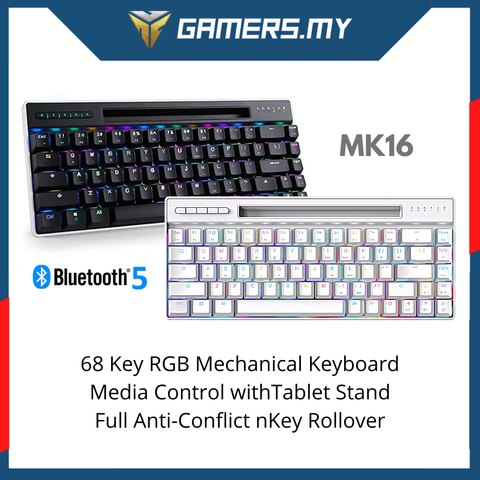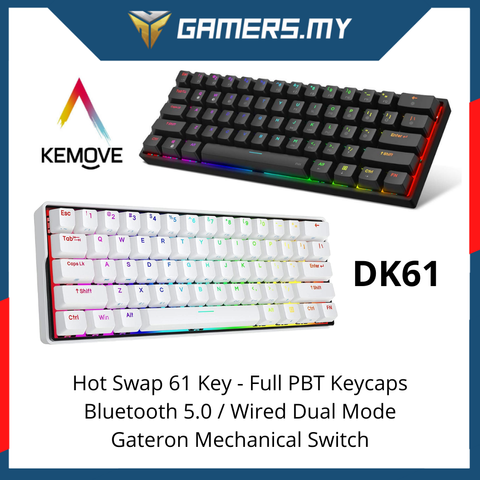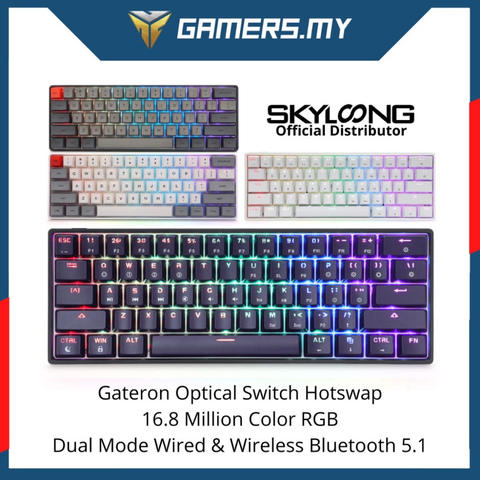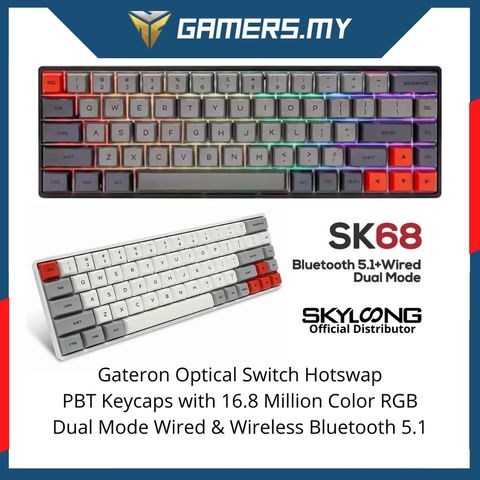When it comes to choosing the best keyboard switches, mechanical and optical switches are two of the most popular options. Whether you're a gamer, typist, or just a keyboard enthusiast, understanding the key differences between mechanical and optical switches can help you make an informed decision. In this guide, we’ll explore the pros and cons of both types of switches, focusing on durability, performance, customization, and compatibility to help you choose the right one for your needs.
Mechanical vs. Optical Switches Comparison Table
| Feature | Mechanical Switch | Optical Switch |
|---|---|---|
| Actuation Mechanism | Metal contacts (traditional mechanical system) | Light-based actuation (infrared light beam) |
| Durability/Lifespan | 50 million keystrokes or more | 80 million keystrokes or more |
| Switch Types | Linear, Tactile, Clicky | Linear, Clicky |
| Actuation Time | Slightly slower (depends on switch type) | Faster (as low as 0.2ms) |
| Switch Feel | Tactile feedback, various options for feel | Smoother, quieter with less tactile feedback |
| Typing Noise | Varies by switch type (clicky variants are loud) | Generally quieter, especially linear switches |
| Customization Options | Highly customizable (lubing, spring swapping, etc.) | Less customizable due to light-based actuation |
| Compatibility | Universal compatibility with most mechanical keyboards | Requires optical-compatible PCB layouts |
| Key Rollover | Good to excellent, depends on the keyboard | Excellent rollover, particularly for gaming |
| Anti-Ghosting | Some ghosting on lower-end boards | Strong anti-ghosting performance |
| Price | Generally higher due to the complexity of the design | More affordable than mechanical switches |
| Best For | Typing enthusiasts, gamers, and those who prefer variety | Competitive gamers, high-speed typing needs |
1. Actuation Mechanism: Metal Contacts vs. Light-based Actuation
Mechanical Switch: These switches use metal contacts to close a circuit when a key is pressed. This traditional approach is highly regarded for providing a tactile feedback or a clicky sound, making it ideal for typing enthusiasts and gamers who enjoy the physical feel of each keystroke.
Optical Switch: Instead of metal contacts, optical switches use infrared light beams to register a keystroke. When you press the key, it either blocks or unblocks the light, resulting in a much faster response time and a smoother actuation process.
Key Takeaway: Mechanical switches provide tactile feedback through metal contacts, while optical switches offer smoother, faster actuation via light.
2. Durability and Lifespan
Mechanical Switch: Typically rated for 50 million keystrokes, mechanical switches are known for their reliability. However, the metal contacts can degrade over time, affecting their longevity and feel.
Optical Switch: Optical switches generally last longer, with a lifespan of up to 80 million keystrokes. This is due to the lack of metal parts, which means there’s less wear and tear, making them a more durable option.
Key Takeaway: Optical switches have a longer lifespan than mechanical switches due to their contactless actuation mechanism.
3. Switch Feel and Performance
Mechanical Switch: Mechanical switches come in a variety of options, including linear, tactile, and clicky. These provide different typing experiences, allowing you to choose based on preference. The response time is generally fast, but slightly slower than optical switches due to the physical nature of the actuation.
Optical Switch: Optical switches are known for being smoother and quieter, especially when compared to their clicky mechanical counterparts. They also feature faster actuation (as low as 0.2ms), making them the go-to choice for competitive gamers who need ultra-fast key registration.
Key Takeaway: If you want more customization in feel, mechanical switches are your best bet, but for speed and smoothness, optical switches excel, especially for gaming.
4. Customization Options: More Control vs. Less Flexibility
Mechanical Switch: Mechanical switches are widely regarded for their high customizability. You can modify the switches by lubricating them, changing springs, swapping keycaps, and even adjusting the key travel to get your perfect typing experience.
Optical Switch: Optical switches are typically less customizable. Due to the light-based actuation system, they don’t offer the same modding potential as mechanical switches. Most optical switches come in linear or clicky varieties, with fewer options for tactile feedback.
Key Takeaway: If customization is important to you, mechanical switches offer much more flexibility compared to optical switches.
5. Compatibility
Mechanical Switch: Mechanical switches are compatible with a wide range of mechanical keyboards, especially those that support hot-swappable switches. They can be used across various PCBs, making them universally compatible.
Optical Switch: Optical switches require optical-compatible PCBs. They won’t work with most standard mechanical keyboards, so you’ll need to make sure your board supports optical switches before purchasing.
Key Takeaway: Mechanical switches offer greater compatibility with various keyboard setups, while optical switches require specific optical layouts.
6. Price: Mechanical vs. Optical
Mechanical Switch: Due to their more complex design and the variety of switch types available, mechanical switches tend to be more expensive.
Optical Switch: Optical switches are generally more affordable, offering a budget-friendly option for those seeking high performance without the higher price tag.
Key Takeaway: If you're on a budget, optical switches are a more cost-effective option, while mechanical switches are pricier but offer a wider range of customization.
Conclusion: Which Switch is Right for You?
The choice between mechanical and optical switches ultimately comes down to personal preference and use case:
- For Typing and Customization: If you prefer a more tactile feel and the ability to mod your switches, mechanical switches are ideal.
- For Competitive Gaming and Durability: If you need faster actuation, smoother key presses, and better longevity, optical switches are perfect.
Both types of switches have their strengths, so it’s essential to consider factors like typing experience, gaming needs, and budget when making your decision.





